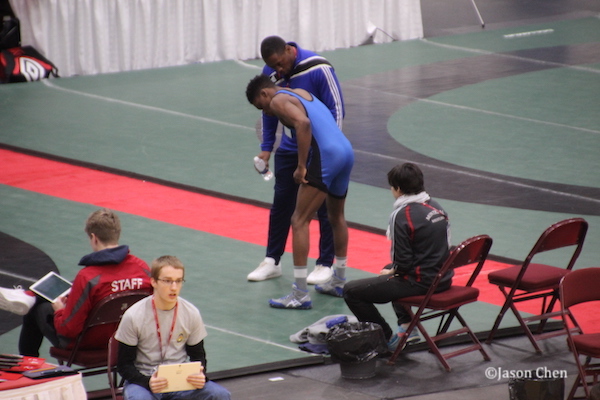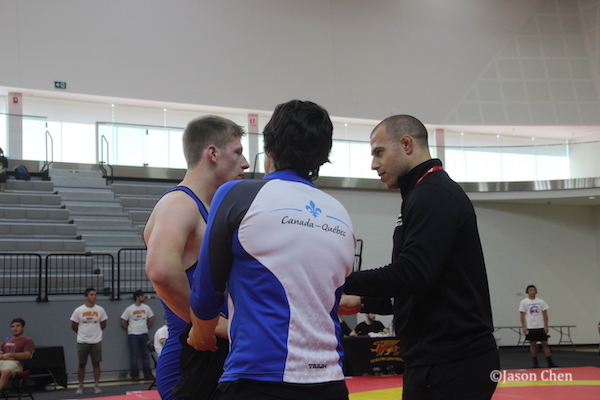Thursday October 24th 2019
This blog will be slightly different from some of my previous entries in that normally I talk about what’s on my mind concerning wrestling in the province of Quebec. While this won’t change as much, the tone will be slightly different. I guess by the title, you can already assume that I’ll be focusing more about wrestling instruction rather than what’s going on at this time. The inspiration for this article came from when I was running a wrestling clinic for adults at a Martial Arts gym downtown. Most of the people there will never compete in wrestling, nor will they become members of the Quebec Wrestling Federation. It almost seems like a pointless exercise if recruitment for competition was the focal point. Instead, the purpose of these clinics is to raise awareness of the sport in our province in order to help increase possible enrollment for the future. In other words, we’re looking for generational benefits that may come from this. One of the participants after the session was over, asked me what was the best school for adult wrestling. To be clear, what I run is a monthly clinic for a half an hour. It’s not a regular weekly class and while I try to make the progression linear, most people would agree that running regular class would have more of an effect. I simply don’t have the time for that. That’s why I’m glad that my short clinics had sparked some interest and that he was willing to take it even farther. I suggested some clubs that catered to his age demographic and he then asked me how good the coaches were. It then occurred to me that no matter what we do and where we go in life, we always want the best for ourselves. While pretty much every club that I suggested had a competent coach, it’s only natural that we would want the best, whether it’s the best food, the best accommodations or the best education. So it shouldn’t come as a surprise that someone would want the best available coach out there. In my mind, this would translate to an expert level coach. Someone who’s coached for many years and has the results to back it up. However, as I thought about the viability of having an expert level coach to teach beginners, I started to realise how impractical that would be. Here are some of the reasons why;
Expert level coaches may not want to work with all levels
This statement is self-explanatory as expert level coaches have often gone through the ranks, progressing from developmental to high-performance. It takes a very different skill set to work with each group and sometimes expert-level coaches may not want to focus on development. While we tend to see this progression in professional sports (how often will you see an NHL coach work extensively with players below the Junior or AHL level on a consistent basis?), the lines are more blurred in amateur sports where a variety of factors may influence where a coach ends up. Nevertheless, an expert level coach may just confine themselves to higher level athletes, thus making the availability of the “best coach out there” impossible.

Some coaches fit well at every level
Expert level coaches may be “too advanced”
I have a saying that I tell my younger level athletes when they complain about either doing the same technique over and over again. They’re basically expressing their boredom and as a result want to learn a more advanced, and some would say, flashier technique rather than a more basic or “mundane technique” that they’ve been drilling for the past month. I tell them that by asking me this, they want to fly a fighter jet, but at their current level, they can barely ride a bike. The old saying you have to learn to crawl before you can run is a perfect parallel to this. Some expert level coaches that I’ve encountered would rightfully assume that the athletes under their charge have a fundamental grasp of basic to advanced concepts. More complicated techniques go on the premise that certain basic techniques have been learned and mastered and can therefore be built upon. When I tell my athletes that they need to learn to ride the bike first, I’m stating that they still haven’t learned the basics well enough yet in order to move on to the more advanced techniques. To teach them these more advanced techniques without prior mastery of the more basic ones would be like building a house on a foundation made from sand. It won’t hold together. Therefore, some expert level coaches might be speaking a language to advanced for someone with only a basic understanding and the instruction might not be nearly as effective. We need athletes to come in with a basic level of understanding before moving on to higher levels. After all, you wouldn’t expect someone with a basic high school education to write their Doctoral Thesis. Then why should we not hold athletes to the same standard?
Expert level coaches may not have the time
There are only so many hours in the day that can be filled with training and competition. Coaches spend all their time on getting the best out of their athletes, hoping only to see them meet or exceed their expectations. People who start the sport of wrestling at an adult have very different motivations. More often than not, the potential benefit of having an older beginner around won’t be equal to the time invested if coaching competitive wrestling is your end goal. Therefore, why would an expert level coach, who gives their time to the betterment of others, take their time to develop an athlete that will never compete? Time is your most valuable resources and you only have a finite amount of it. At the risk of sounding harsh, why would you waste your time on a beginner if you’re an expert level coach? Unless there’s a specific set of circumstances, I can’t see why.
Lack of patience
I’ve often heard some coaches say that they don’t want to deal with beginner athletes because they don’t have the patience anymore. The concept of showing basic technique is boring to them and they feel that they’re ready to move on. No one can begrudge anyone for this as a change of pace can not only be beneficial for a coach, but necessary in their growth. Subsequently, some coaches won’t have the patience to re-hash techniques that they’ve been doing for many years, something that would be done quite a bit with a beginner level athlete. Again, adding to the fact that the potential benefits might not be there (the athlete’s ability or desire to compete in tournaments) and it’s not hard to see why some coaches just don’t have the patience to take on beginners.

Expert level coaches have given so much to the sport
So, what does this blog say in the end? Well, it’s pretty clear that we want the best in everything. We associate this with the fact that we have access to this, and we feel that it may elevate our status to a certain extent. While this feeling of wanting the best is natural, it may not always be the best fit. Trying to put that square peg into the round hole just won’t work at that point in time. Finding the right hole for that square peg later on will not only be a better fit but will definitely require less effort. In short, while having the expert coach may make you feel better about your instruction, it may not be the best coach for you.
